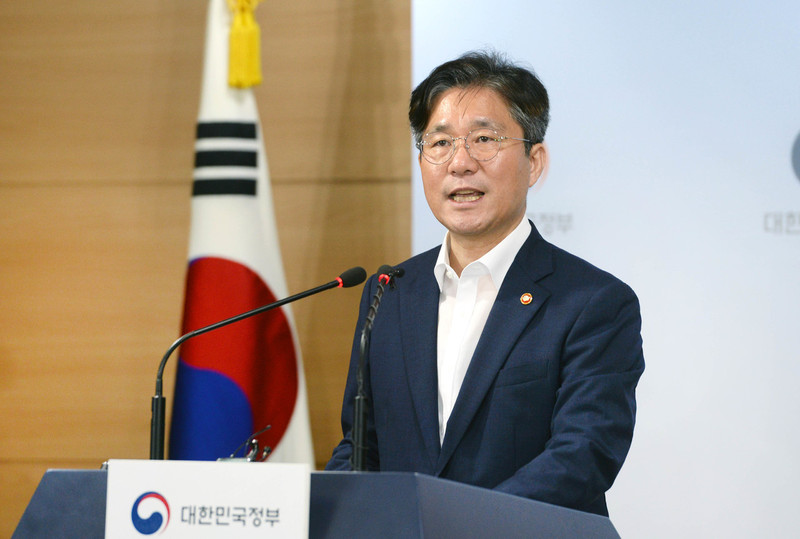 |
|
South Korean Minister of Trade, Industry, and Energy Sung Yun-mo criticizes Japan’s move to remove South Korean from its white list during a press conference on July 24. (provided by the Ministry of Trade, Industry, and Energy)
|
Seoul explicitly states its reasons for protesting retaliatory trade measures to Tokyo
The South Korean government sent an official opinion to the Japanese government on July 24 calling its intensification of export controls “unjust.” It also stressed to member countries in the WTO General Council that Japan’s actions constitute a violation of WTO norms and threatening behavior that jeopardizes global support networks. The Ministry of Trade, Industry, and Energy (MOTIE) announced that it had sent an opinion by email to the Japanese Ministry of Economy, Trade, and Industry (METI) at around 10 am that day. July 24 marked the last day of METI’s investigation of domestic and public comments on an amendment to its Export Trade Control Order to remove South Korea from its “white list” of countries receiving preferential treatment on export controls. In a press conference that day, South Korean Minister of Trade, Industry and Energy Sung Yun-mo harshly criticized the measures from Tokyo, calling the issue a “deeply serious matter that undermines the basis for a South Korea-Japan economic partnership that has been closely sustained and developed for over 60 years and for security cooperation in Northeast Asia.” He went on to urge Japan to agree to dialogue, insisting that Tokyo “confront the fact that the Japanese amendment is a short-sighted measure which, if implemented, will have a negative impact not only on South Korean businesses but also Japanese ones.” The Japanese-language opinion text stretched to a total of 20 pages and included a message of dismay over the Japanese measures, a demand for their withdrawal, and four reasons that they are unjust. In the opinion, the government offered a point-by-point rebuttal of Japan’s claims that South Korea’s catch-all system (a form of export controls for items not included on a list of strategic goods but viewed as risks for use in weapons production and development) for conventional weapons is inadequate. As bases for its argument, it noted that a legal basis for the conventional weapon catch-all system does exist in the Foreign Trade Act; that effective controls are applied throughout the prevention, permission, and policing process; that the Japanese government was informed in writing about the operation of a convention weapon catch-all system in 2015; and that Japan’s current white list includes at least one other country that has not introduced a catch-all system for conventional weapons. Indeed, no explicit reference to a catch-all system for conventional weapons exists in Canada’s Export and Import Permits Act or Export Control List. Responding to Japan’s claims that mutual trust has been damaged by the failure to hold meetings of the two sides’ council on strategic goods over the past three years, the opinion stated this had to do with “schedule coordination issues,” providing a chronological list of continued communications by the two sides to schedule a seventh meeting following the sixth one hosted by South Korea in June 2016. It also noted Japan’s response that it “understood the situation” when South Korea informed it late last year that a meeting would be difficult to schedule through March 2019. US industry protests “non-transparent and unilateral” measures, calling for resolution Meanwhile, five information and communication technology-related groups, including the US Semiconductor Industry Association (SIA) and the international semiconductor equipment and materials association SEMI, sent an open letter to Japanese Minister of Economy, Trade, and Industry Hiroshige Seko and South Korean Minister for Trade Yoo Myung-hee on July 23 calling for a swift resolution to the issue. The groups, whose members include major IT companies such as Apple and Qualcomm, stressed the “important role” that South Korea and Japan play in the global value chain. “Non-transparent and unilateral changes in export control policies can cause supply chain disruptions, delays in shipments and ultimately long-term harm to the companies that operate within and beyond your borders, and the workers they employ,” the letter warned, sending a clear message that the Japanese export control measures are seen as “non-transparent and unilateral.” Yoo, who is visiting the US, made reference to the letter in a message on her Facebook page. “As even US businesses are concerned about the negative influence of Japan’s measures, I urge Japan to reverse its export controls on the items and withdraw its amendment plan to exclude South Korea from its white list,” she wrote. By Choi Ha-yan and Shin Da-eun, staff reporters Please direct comments or questions to [english@hani.co.kr]






